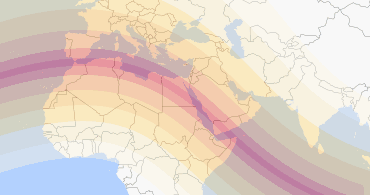A total solar eclipse of extraordinary duration will captivate skywatchers over Europe, North Africa, and the Middle East. This celestial event is expected to be the longest total solar eclipse observable from land since 1991.
The solar eclipse’s magnitude of 1.079 implies that the Moon’s apparent diameter will be much greater than the Sun’s, resulting in total obscuration of the solar disk. This extended totality is due to three simultaneous astronomical conditions. The Earth will be at its farthest point from the Sun (aphelion), making the Sun appear slightly smaller. The Moon will be at its closest point to Earth (perigee), making it appear larger. The solar eclipse’s path will be close to the equator, where the Earth’s rotational speed causes the Moon’s shadow to move more slowly, prolonging the event.

The route of totality, a small band around 258 to 275 kilometers wide, will start over the eastern Atlantic Ocean and go east.
A partial solar eclipse will be visible across a much larger area. It includes nearly all of Europe, most of Africa, the Middle East, South and Southeast Asia, and parts of eastern North America.
Solar Eclipse timings:
Local eclipse times will vary by region. Total eclipse is forecast in Southern Spain between 13:30 and 14:00 local time (CEST). The peak in North Africa, such as Libya and Egypt, will occur between 14:00 and 14:30 local time (EET), while totality in Saudi Arabia will occur around 15:00 local time (AST). The entire event, from the start of the partial eclipse to its conclusion, will last about 2.5 to 3 hours.
Astronomers and skywatchers view this event as an excellent opportunity to observe the Sun’s corona. NASA recommends choosing areas with clear weather forecasts above those that are only close to the path of totality . Tunisia has formed a national eclipse committee to manage activities surrounding this unusual astronomical phenomenon.








